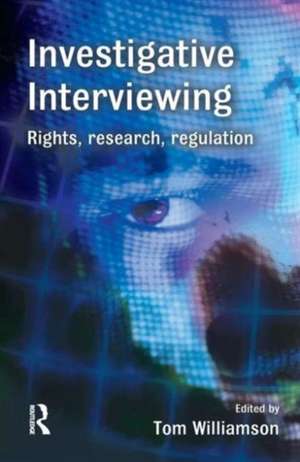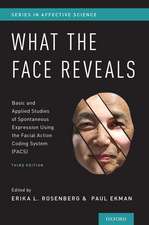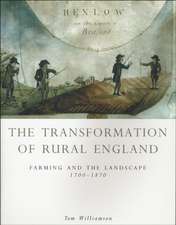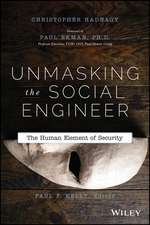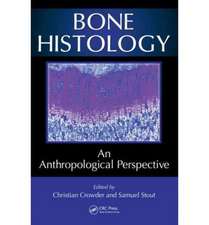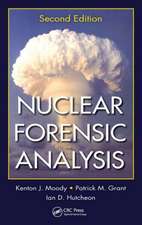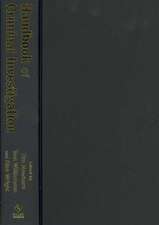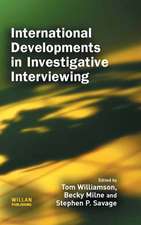Investigative Interviewing
Editat de Tom Williamsonen Limba Engleză Hardback – noi 2005
| Toate formatele și edițiile | Preț | Express |
|---|---|---|
| Paperback (1) | 342.51 lei 6-8 săpt. | |
| Taylor & Francis – 22 mai 2015 | 342.51 lei 6-8 săpt. | |
| Hardback (1) | 1015.48 lei 6-8 săpt. | |
| Taylor & Francis – noi 2005 | 1015.48 lei 6-8 săpt. |
Preț: 1015.48 lei
Preț vechi: 1238.38 lei
-18% Nou
194.31€ • 202.87$ • 160.82£
Carte tipărită la comandă
Livrare economică 05-19 aprilie
Specificații
ISBN-10: 1843921243
Pagini: 392
Dimensiuni: 152 x 229 x 25 mm
Greutate: 0.89 kg
Ediția:1
Editura: Taylor & Francis
Colecția Willan
Locul publicării:Oxford, United Kingdom
Cuprins
Part I: Developments in Rights 1. Investigative interviewing and human rights in the war on terrorism, Tom Williamson 2. Al-Qaeda-related subjects: a law enforcement perspective, Michael G. Gelles, Robert McFadden, Randy Borum and Bryan Vossekuil 3. American interrogation methods in the war on terror, David Rose 4. The interrogation of terrorist suspects: the banality of torture, John J. Pearse Part II: Developments in Research 5. The psychology of rapport: five basic rules, Michel St-Yves 6. Confessions by sex offenders, Michel St-Yves 7. The psychology of interrogations and confessions, Gisli H. Gudjonsson 8. Towards greater professionalism: minimizing miscarriages of justice, Tom Williamson 9. Will it all end in tiers? Police interviews with suspects in Britain, Andrew Griffiths and Becky Milne 10. The Reid Technique of interviewing and interrogation, Joseph P. Buckley 11. A critical appraisal of the Reid Technique, Saul M. Kassin 12. Investigative interviewing and the detection of deception, Mark G. Frank, John D. Yarborough and Paul Ekman Part III: Developments in Regulation 13. Recovered memories, James Ost 14. Investigative interviewing: suspects' and victims' rights in balance, Robert Roy 15. Regulating police interrogation, David Dixon 16. Conclusion, Tom Williamson
Notă biografică
Tom Williamson was a senior police officer in both the Metropolitan and Nottinghamshire police forces. He was also one of the pioneers behind the establishment of the Institute of Criminal Justice at Portsmouth University in 1992.
Descriere
The objective of this book is to review the position of investigative interviewing in a variety of different countries, with different types of criminal justice systems, and consists of chapters written by leading authorities in the field, both academics and practitioners. A wide range of often controversial questions are addressed, including issues raised by the treatment of detainees at Guantanamo Bay, The Reid model for interviewing and miscarriages of justice, the role of legislation in preventing bad practice, the effectiveness of ethical interviewing, investigative interviewing and human rights, responses to miscarriages of justice, and the likely future of investigative interviewing. The book also makes comparisons between British and American approaches to detention without trial, and the role of confession evidence within adversarial legal systems. It also develops a set of proposals to minimise the risks of miscarriages of justice, irrespective of jurisdiction.
